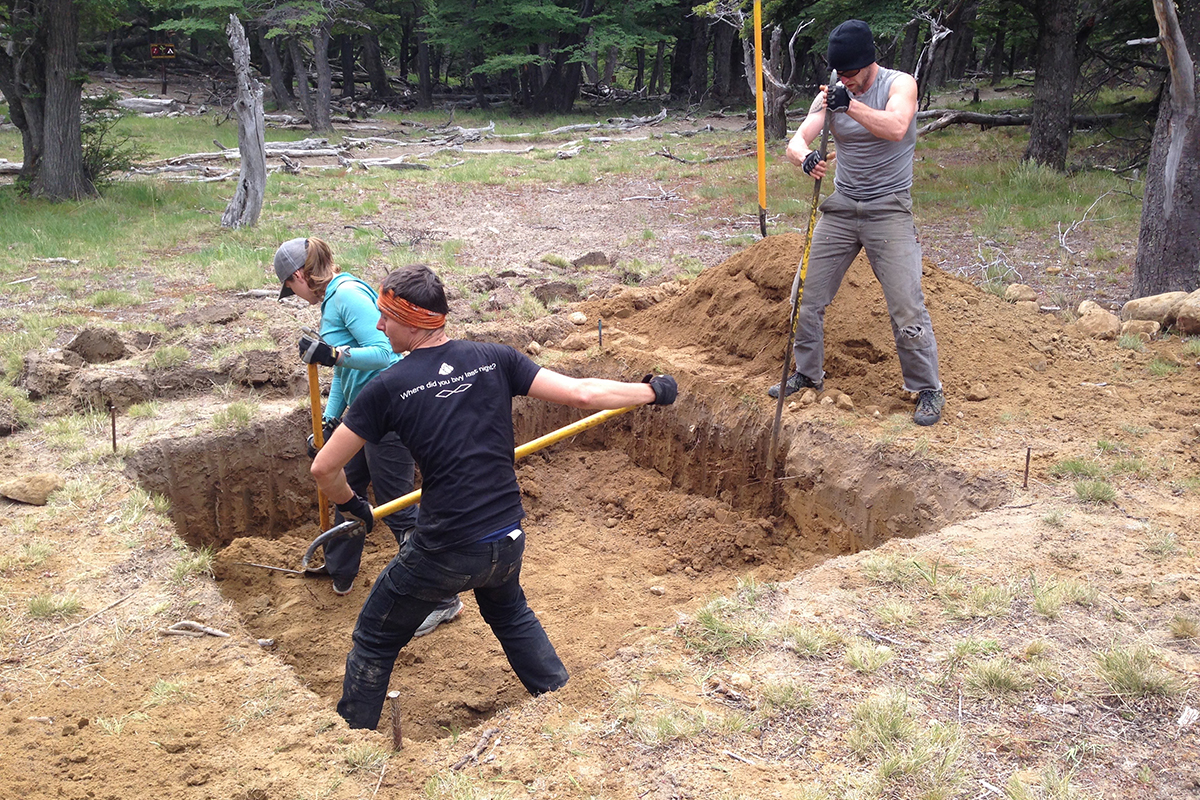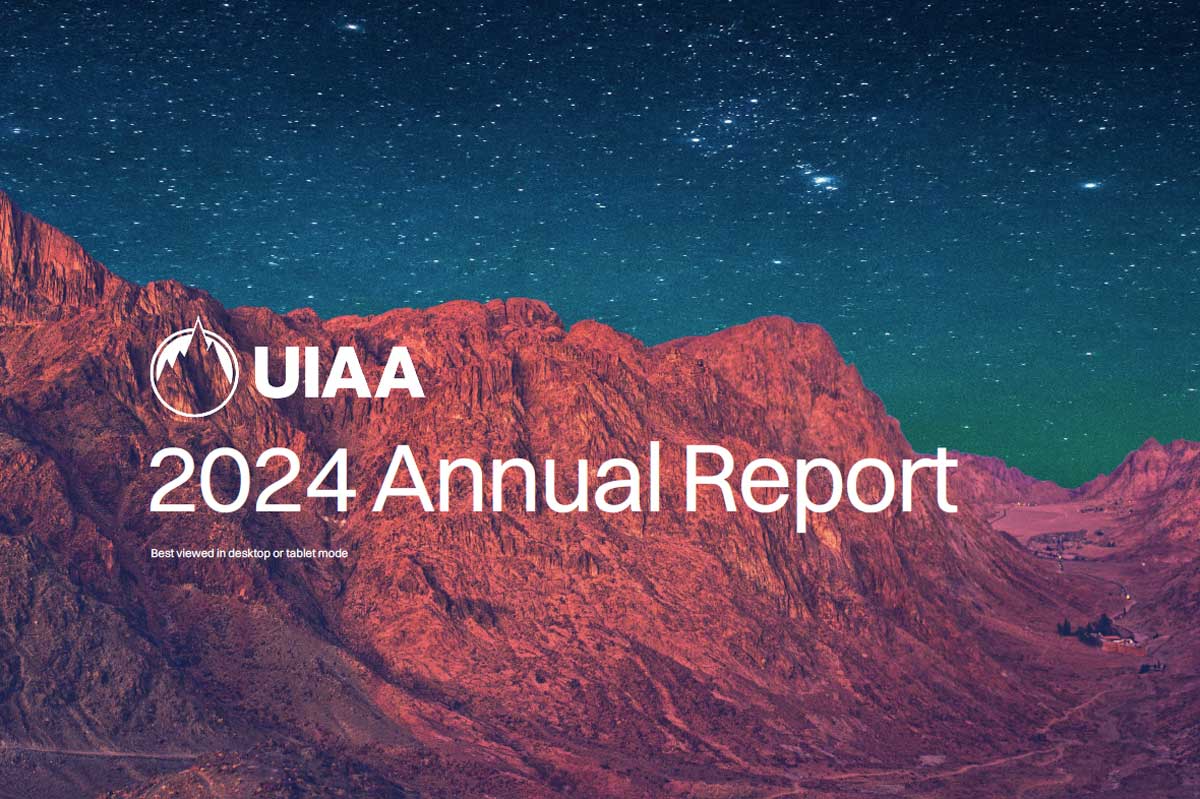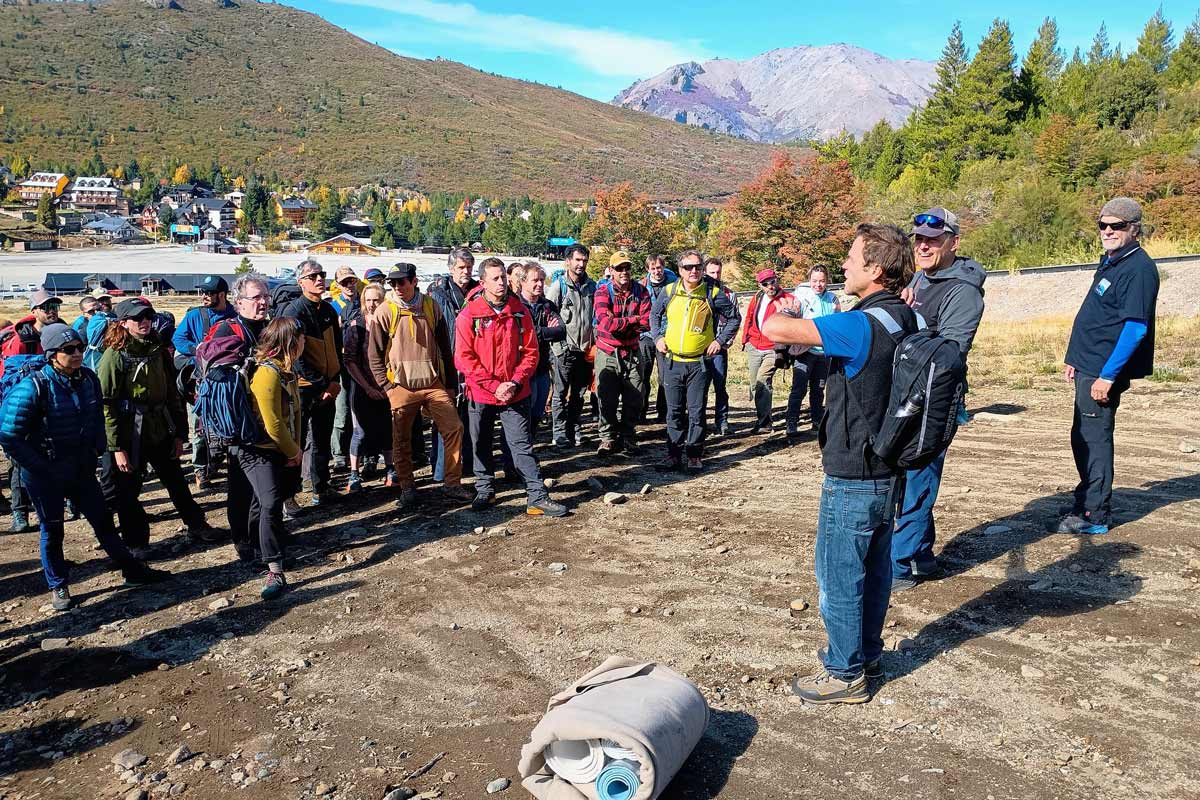Acceso PanAm:
Managing human waste in advance base camps in Patagonia
Project Status: on going
Location: Latin America
GOALS AND OBJECTIVES
Our goal is to find simple, inexpensive options to manage human waste in advance base camps in Patagonia that are remote, have no septic systems or transport via helicopter sling loads. The long-term, permanent goal is to provide a healthier human experience in these great mountains as well as improving the local environment by minimizing human waste and disposing of it properly.
Objectives of the first season (2015/16)
- Build one pilot study vermicomposting toilet with an urine diversion system at Laguna Capri, Los Glaciares National Park, El Chaltén, Argentina
- Manage the use and care of the toilet.
Objectives of the second season (February 2017)
- Evaluate the effectiveness of the test piece and;
- Improve the use and care of the toilet.
- Promote more awareness about the project.
- Study the context of the Piedra Negra bivvy site.
Objectives of the third season (November 2017)
- Propose appropriate human waste management solutions for two climbing base camps in the El Chaltén Massif.
- Provide guidelines for the use and care for each area, considering its proposed management strategy.
- Establish guidelines to research the results of the proposed strategies.
HOW DOES IT CONTRIBUTE TO MOUNTAIN PROTECTION
The Chaltén Massif in the Santa Cruz Province of Argentina is a popular destination to climbers. Climbers from all over the world come to El Chaltén during the southern hemisphere summer (Dec-Mar) to try to climb vertical alpine granite spires.
The area is known for its complex and remote routes as well as for its unpredictable weather. Long routes and approaches, strong winds, sudden storms, and a tough environment make climbing in Chaltén a big challenge. This complexity imposed a natural restriction on the number of climbers that challenged the mountains and themselves in the area. However, this context has been changing in the past decade in response to the development of the village as a tourism destination and the effectiveness of weather forecast.
The number of climbers exploring the massif has grown considerably and waste management has become a necessity in some areas. Right now, the climbing basecamps’ waste management is non-existent. Many climbers are aware of minimum-impact waste disposal practices, and where applicable, dig cat holes. However, most of the camps are in glacier environments (dry glacier, moraines, and glacier), so cat holes are not always a possibility and human waste can’t break down properly. The lack of a waste management solution results in poor disposal methods or long-term cumulative effects, which has the potential to cause social and environmental impacts.
Human feces can create human health issues through direct contact with the pathogens or indirect contact with contaminated water. Socially, feces can cause negative reactions on climbers and non-climbers who come in contact with improperly disposed human waste (Cilimburg, Monz and Kehoe 2000 upon Access Fund, 2008).
Bottom line: There is a need for preventive care and the establishment of waste management solutions. The Patagonia Waste Management project addresses this issue by proposing solutions that will provide a more sustainable and human experience as well as are economically feasible, low maintenance, and provide a long-term solution to the area, especially considering the park’s budget and personnel restrains.
COLLABORATION WITH LOCAL COMMUNITIES
El Chaltén is a young village that has seen a lot of growth in the last decade. In 2008 the dirt roads were paved; there is now over 20 lodging options areas, 15+ restaurants, three grocery stores, and easy road access; all in a town with around 1,500 inhabitants in peak season. Internet has also reached town and brought along the easiness of forecast accessibility, allowing climbers to better plan their incursions.
The village depends on tourism that happens almost exclusively during the summer. The incredible granite spires of the Fitz Roy and Torre Massifs attract tourists from all over the world in search of adventure along the hiking trails or climbing routes. Climbing in the area has hap-pened since the 1910s. In fact, the town breathes the climbing spirits, with world-class climbers doing incredible feats and climbing guides settling in the area for making a living.
The Patagonia Waste Management project promotes healthier experiences for climbers and hikers alike in the mountains for both local and out-of-town adventurers. By doing so, it directly benefits and reinforces the touristic identity of El Chaltén, helping to attract more tourists, who get to experience a more humane experience in the mountains.
Through an outreach program, the project educates locals about human waste management in remote location, and stimulates local guides and climbers to be stewards of the park. By giving voice to the local community through meetings and planning, the project also empowers them to take care of the mountains, which is at the same time their backyard, their source of income, and their inspiration.
The project also has had the opportunity to work closely with the park administration, involving them in the planning and management process. The interaction with the park has the potential to improve the relationship between the park staff and local guides and climbers by exchanging different points of view about the same issue while also constructing the knowledge and awareness about waste management. At the same time, the project promoted a few training sessions with the park staff so they could critically analyze and take care of the units or management solutions.
Finally, this project benefits the local communities by potentially increasing water quality in the surrounding areas, which also increases the user experience. These are some of the most iconic mountains on earth and there imminent care is a necessity.
COLLABORATION WITH LOCAL AUTHORITIES
The project is the result of the collaboration between different organizations and people.
Access PanAm works directly with the Argentinean National Park Agency (Administración de Parques Nacional, APN) to coordinate logistics of this project. During the three years of the project, this became an established and good relationship. APN has provided housing and portering support during the first year of the project. The use of their wood shop was essential to the construction of the test piece. Their intimate knowledge about visitation issues in the area contributed decisively to the planning process.
The Park has carried out a throughout study about the worms found in the local site of the pi-lot study, which concluded that they were native species to the park. Therefore, we were able to add worms to the fecal pile on the second season, which will accelerate decomposition. Ultimately, the Park management is also responsible for maintaining the unit.
Access PanAm has a partnership with Toilet Tech to offer the best solutions concerning waste management. Dr. Geoff Hill, director of Toilet Tech, has a Phd. from the University of British Columbia in waterless human waste management in 2013. He has been inside dozens of waterless toilets throughout the world and knows intimately what makes a toilet work well (urine diversion) and what makes a toilet smell and fail (urine mixed with fecal matter). He provides key consultation and solutions for the project.
Last but not least, Access PanAm collaborates with a series of dedicated volunteers to this project, including the work of Steffan Gregory, a climbing and canyoneering guide based in Southern Utah, who has dedicated over 1.000 hours to this project. Under his leadership, the project has worked together with the local guiding organization and some prominent local climbers, such as Rolando Garibotti.
BEYOND ‘BUSINESS AS USUAL’
This project proposes human waste management solutions to the Patagonia region by analyzing different visitation aspects and environmental contexts in one of the most iconic areas of the planet.
The caliber of science behind the toilet comes from one of the most highly regarded Doctors of waterless human waste management in North America, Dr. Geoff Hill from Toilet Tech. His participation in the project contributes to the solutions and recommendations based on about 10 years of experience in the theme.
Access PanAm is also quite unique – this non-profit organization was created in 2009 by inspiration of one of the most experienced mountain access and conservation advocate in the USA, Armando Menocal, who was also a founding member of North America’s Access Fund. Access PanAm’s deep knowledge in South America has contributed decisively to success of the project.
Another aspect of the project that differentiates itself from others and is at the same time an example of best practice is the dedication of several volunteers, who managed to construct a toilet structure measuring 2.5×2.5×3.6 meters 4 km from town – mainly 4-6 people working full time for 55 days with some extra volunteers helping for a few days. The extreme dedication of volunteers is one of the aspects that make this project unique. Working with volunteers is not on itself an innovation, but the amount of the dedication and involvement has certainly gone beyond business as usual. The level of attention to detail and caliber of crew is far beyond “business as usual.” As an example, the Project Manager, Steffan Gregory, has dedicated over 1.000 hours for the project since 2015.
One of the mayor issues concerning visitation in protected areas nowadays is human waste. The proposal of solutions to deal with this issue in popular and remote backcountry base camps contributes to protecting the mountain environment, while at the same time promoting users education and empowerment.
VOLUNTEER OPPORTUNITIES
The project only could happen through the work and dedication of many volunteers. Besides the Project Manager, three other full-time volunteers dedicated over 400 hours each to the project, including the lead carpenter during the first season. The second season had three dedicated volunteers and two full-time volunteers are scheduled to travel to Patagonia for the third season. Furthermore, over ten volunteers have helped in different aspects of the project, from planning and fundraising to actually building the test piece.
The outreach actions of the project have also helped to promote stewardship in the mountains, especially among locals. Participatory meetings, presentations, and the involvement of the local climbers have promoted more debate and awareness about the issue.
This project supports stewardship in mountain ranges by incorporating the local community of El Chaltén to become involved with waste management in the park. The national park in this area is understaffed and will need support in order for the project to continue to succeed. In this past year the guides association in El Chaltén offered their support and is the start of a larger community backing beyond the national park. This project is just the beginning of waste management in the area and the possibilities for future stewardship are endless.
CONTACT
Acceso PanAm
E: apa@accesspanam.com
W: http://accesopanam.com/en/




